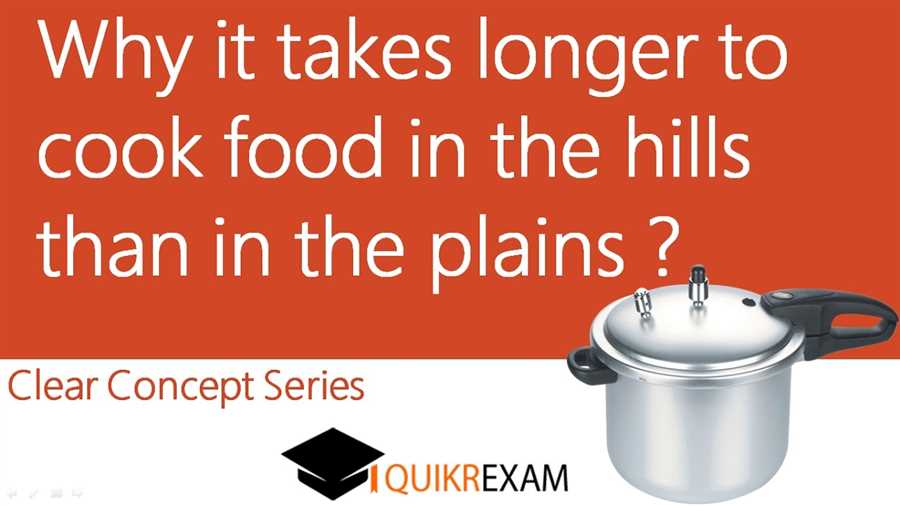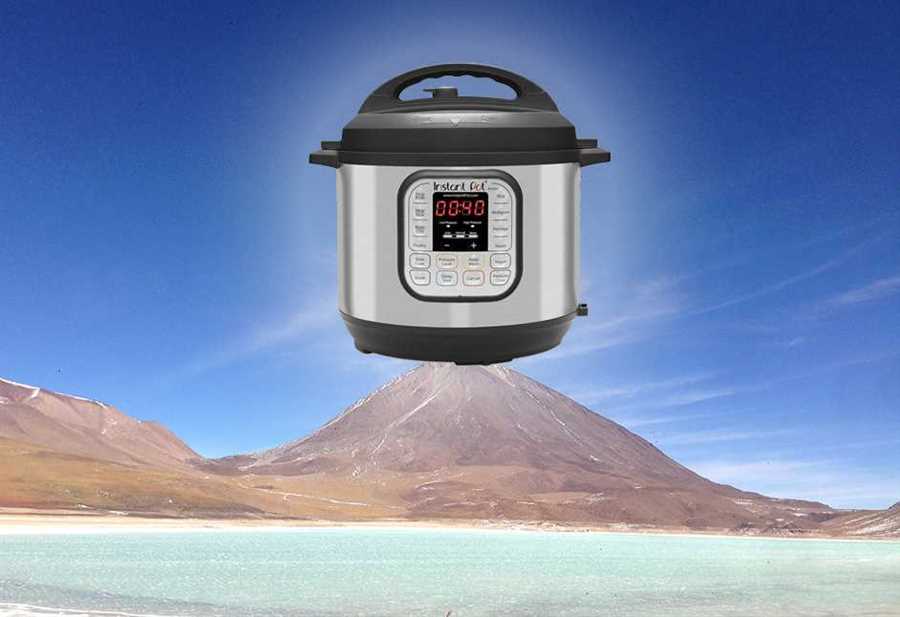





Altitude can have a significant impact on the cooking process and the time it takes to prepare a meal. At higher altitudes, such as in mountainous regions, the lower atmospheric pressure affects various factors that influence cooking. One of the most noticeable effects is that water boils at a lower temperature. This means that it takes less energy to bring water to its boiling point, but it also means that the boiling point is lower than at sea level. As a result, foods may take longer to cook because they are not subjected to the high temperatures experienced at lower altitudes.
When it comes to baking, the reduced air pressure affects the rising process. The lower pressure causes the air bubbles in the dough to expand more rapidly, resulting in a higher rise and quicker baking time. As a result, baked goods may have a lighter texture and a slightly dry or crumbly consistency.
It’s important to make adjustments to recipes when cooking at high altitudes to ensure that the food is properly cooked. These adjustments include increasing the cooking time, adjusting oven temperatures, and making alterations to the ingredients. For example, adding more liquid to counteract the faster evaporation caused by the lower boiling point of water.
Overall, cooking at high altitudes can be challenging and require some experimentation to achieve the desired results. Understanding the effects of altitude on cooking can help ensure that meals are cooked properly and with the right level of doneness.
Do things cook faster?
There is a commonly held belief that food cooks faster at higher altitudes, but is this actually true? Let’s explore this question and find out the answer.
The science behind cooking times

Cooking times for food are determined by a variety of factors, including temperature, pressure, and humidity. At higher altitudes, the boiling point of water decreases due to the reduced atmospheric pressure. This means that water boils at a lower temperature, which can affect cooking times.
When water boils at a lower temperature, it takes longer for food to cook because it is not being exposed to the same level of heat. This can result in longer cooking times for foods such as pasta, rice, and other grains.
Adjusting cooking times at high altitude
If you are cooking at a higher altitude, it may be necessary to adjust your cooking times to ensure that your food is cooked properly. Here are some general guidelines for adjusting cooking times at high altitudes:
| Altitude | Adjustment |
|---|---|
| 3,000 – 5,000 feet | Increase cooking time by 5-10% |
| 5,000 – 7,000 feet | Increase cooking time by 10-15% |
| Above 7,000 feet | Increase cooking time by 15-25% |
These adjustments are not exact and may vary depending on the recipe and the specific conditions at your altitude. It is always a good idea to experiment and make adjustments based on your own experience.
In conclusion, food generally takes longer to cook at higher altitudes due to the lower boiling point of water. It is important to adjust cooking times accordingly to ensure that your food is cooked properly. By understanding the science behind cooking times and making necessary adjustments, you can create delicious meals no matter the altitude.
at high altitude?
When cooking at high altitude, several factors can affect the cooking process and cause things to cook faster.
One of the main factors is the decreased air pressure at higher altitudes. As the altitude increases, the air pressure decreases, which affects the boiling point of water. At high altitude, water boils at a lower temperature than at sea level. This lower boiling point means that food cooks at a lower temperature, which can result in longer cooking times.
Additionally, the lower air pressure affects the amount of moisture in food. At high altitudes, the drier air can cause moisture to evaporate more quickly from foods, leading to faster cooking times. This can be especially noticeable when baking, as the evaporation of moisture can cause baked goods to dry out more quickly.
Furthermore, the temperature may also play a role in the cooking process at high altitudes. Higher altitude locations often have cooler average temperatures, which can affect the cooking time of certain foods. For example, grilling or frying may take longer to cook at high altitudes due to the lower ambient temperature.
It is important to note that cooking times and temperatures can vary significantly depending on the specific altitude. It is recommended to adjust recipes and cooking techniques accordingly when cooking at high altitude to ensure optimal results.
Effects of high altitude

High altitude can have various effects on individuals and their environment. Below are some of the key effects of high altitude:
| Effect | Description |
|---|---|
| Decreased oxygen levels | At high altitudes, the air has lower oxygen levels, making it harder to breathe. This can cause symptoms such as shortness of breath, fatigue, and dizziness. |
| Increased UV exposure | At higher altitudes, there is less atmosphere to filter out harmful ultraviolet (UV) rays from the sun. This means that individuals at high altitude are at a higher risk of sunburn and other skin damage. |
| Decreased atmospheric pressure | As altitude increases, the atmospheric pressure decreases. This can lead to a decrease in boiling point, meaning that water boils at a lower temperature. Cooking times may need to be adjusted accordingly. |
| Temperature fluctuations | High altitude locations often experience extreme temperature fluctuations. The lack of atmosphere to trap heat results in colder nights and hotter days. It is important to be prepared for these temperature changes when at high altitude. |
| Altitude sickness | Some individuals may experience altitude sickness when exposed to high altitudes. Symptoms can include headache, nausea, and difficulty sleeping. It is important to acclimatize slowly when ascending to high altitudes to minimize the risk of altitude sickness. |
These are just a few of the effects that high altitude can have on individuals and their environment. It is important to be aware of these effects and take appropriate precautions when spending time at high altitudes.
On Cooking Times
The cooking time for various foods can be affected by high altitude. Due to the lower atmospheric pressure at higher altitudes, water boils at a lower temperature. This means that foods may take longer to cook because the heat is not as intense.
When cooking at high altitudes, it is important to adjust the cooking times accordingly. For example, if a recipe states that a dish should be cooked for 45 minutes at sea level, it may need to be cooked for a longer period of time at a higher altitude.
In general, it is recommended to increase the cooking time by 20-25% for every 1,000 feet (305 meters) above sea level. This can help ensure that food is cooked thoroughly and safely.
Factors Affecting Cooking Times
Aside from altitude, there are other factors that can affect cooking times. The size and thickness of the food being cooked, as well as the type of cookware used, can all impact how long it takes for a dish to cook.
Thicker cuts of meat, for example, will take longer to cook than thinner cuts. Similarly, using a cast iron pan, which retains heat well, may result in faster cooking times compared to a thinner metal pan.
Tips for Adjusting Cooking Times
Here are some tips for adjusting cooking times at high altitudes:
- Increase the cooking time for baked goods, such as cakes and cookies, by a few minutes.
- Test for doneness by using a toothpick or cake tester. If it comes out clean, the food is done.
- Use an oven thermometer to ensure that the temperature is accurate.
- Monitor the cooking process closely to prevent overcooking.
By taking altitude and other factors into consideration, you can ensure that your food is cooked properly and avoid any cooking mishaps at high altitudes.
Factors
Several factors contribute to the differences in cooking times at high altitudes. These include:
- Decreased air pressure: At higher altitudes, the air pressure is lower, which affects the boiling point of water. Water boils at a lower temperature, which means it takes longer to cook food that requires boiling.
- Drier air: High-altitude areas tend to have drier air, which can cause moisture in food to evaporate more quickly. This can result in faster cooking times and the need for more frequent basting or adding additional liquids to prevent food from drying out.
- Temperature changes: High-altitude environments often experience rapid temperature changes. These fluctuations can affect the cooking time of food, especially when using methods that rely on precise temperature control, such as baking.
- Wind: Windy conditions at high altitudes can increase the rate of evaporation and heat loss, which can impact cooking times. It may be necessary to adjust cooking methods to account for these factors.
Understanding these factors can help you make adjustments to your cooking techniques and recipes to ensure successful results at high altitudes.
Questions and answers
Does food cook faster at high altitudes?
Yes, food tends to cook faster at higher altitudes due to the lower atmospheric pressure, which leads to a lower boiling point and faster evaporation.
Why does food cook faster at high altitudes?
Food cooks faster at high altitudes because the lower atmospheric pressure causes water to boil at a lower temperature, which means that it evaporates more quickly and leads to faster cooking times.
How does lower atmospheric pressure affect cooking times at high altitudes?
Lower atmospheric pressure at high altitudes means that water boils at a lower temperature, which leads to faster evaporation and shorter cooking times.
Are there any specific cooking adjustments that need to be made at high altitudes?
Yes, cooking adjustments need to be made at high altitudes. For example, recipes may require longer cooking times and/or higher temperatures to compensate for the lower boiling point and faster evaporation.
What are some tips for cooking at high altitudes?
Some tips for cooking at high altitudes include increasing cooking times and temperatures, using airtight pans or covers to trap steam, and reducing leavening agents such as yeast or baking powder to avoid excessive rising.
Does food cook faster at high altitudes?
Yes, food tends to cook faster at high altitudes. This is because the lower air pressure at higher altitudes affects the boiling point of water. Since water boils at a lower temperature, cooking times need to be adjusted accordingly.







